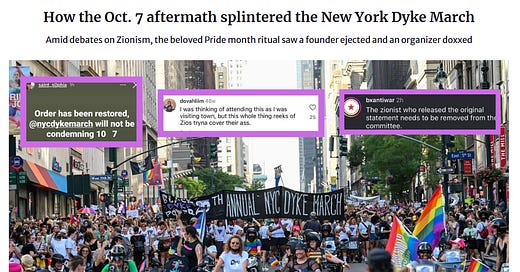What Happened When an "Inclusive" Pride March Banned “Zionists”
An article from the Jewish magazine 'Forward'
The linked article in an independent Jewish magazine (click on the picture below or (here) provides a thorough account of what happened when the New York Dyke March banned “Zionists.”
Traditionally, the New York and other Dyke Marches have prided themselves on being welcoming to all queer women, regardless of their political, cultural, or religious backgrounds. However, that inclusive spirit has unraveled.
Over the past year, the march has adopted increasingly hardline political positions, most notably, instituting an explicit ban on Zionists. Some organizers have framed support for Israel, and even expressions of grief for Israeli victims, as incompatible with queer liberation. For some, even acknowledging Jewish suffering after October 7 has become taboo.
This shift has deeply alienated many Jewish queer women and others who feel that the march now enforces ideological litmus tests that betray its inclusive roots. A founding member was ejected, board members quit, and internal divisions have spilled into public feuds, online attacks, doxxing campaigns, and a splinter march for Jews. The result is a fractured movement.
Key takeaways from the article:
Identity politics divide even progressive movements
Once united under a shared cause, communities like the Dyke March are increasingly torn apart by ideological purity tests and rigid factionalism, with real financial and organizational consequences. The New York Dyke March lost so much financial support and membership that the march nearly disbanded.
The dysfunction of online organizing
Much of the march’s coordination takes place on social media, where the loudest and most extreme voices often dominate. Nuance is lost, and internal conflicts are amplified, sometimes with serious personal consequences for organizers.
The persistence of antisemitism in progressive movements
The controversy revealed how common antisemitism has become in progressive politics. In this case, some march participants labeled Zionist Jews as “white supremacists” and “colonizers,” repeated conspiracy theories such as blaming Israel for 9/11, and spread disinformation about the October 7 attacks.
The contested meaning of 'Zionism'
A central tension is the lack of agreement over what Zionism even means. To some, it's a belief in Jewish self-determination; to others, it's synonymous with colonialism and oppression. This ambiguity fuels conflict and misunderstanding.




